Best Business Continuity Management Software
Best business continuity software includes RS Data Recovery, Continuity Patrol, PST Recovery Software, Exchange EDB Recovery, and Kuali Ready. This software helps organizations conduct business-impact analysis, create and update recovery plans and identify gaps in BCM programs.



No Cost Personal Advisor
List of 20 Best Business Continuity Management Software
Emergents | 2024
Unified Solution for network monitoring and endpoi
RMM Central is a unified solution that helps MSPs manage and monitor multiple client networks from a single console. With capabilities that simplify the everyday routines of MSPs, RMM Central's holistic approach ensures that resources and efforts are minimized. Learn more about ManageEngine RMM Central
Explore various ManageEngine RMM Central features, compare the pricing plans, and unlock the potential of seamless operations by selecting the right software for your business.
- Configuration Management
- Server Monitoring
- User Activity Monitoring
- Performance Analytics
- Real Time Monitoring
- Reporting/Analytics
- Inventory Management
- Data Visualization
Pricing
ManageEngine RMM Central Caters to
- StartUps
- SMBs
- Agencies
- Enterprises
Category Champions | 2024
Leading cloud-based business management solution
Oracle Fusion Cloud ERP is a cloud-based, end-to-end, business management solution designed for mid to enterprise-level customers with advanced capabilities. Read Oracle Fusion Cloud ERP Reviews
Explore various Oracle Fusion Cloud ERP features, compare the pricing plans, and unlock the potential of seamless operations by selecting the right software for your business.
- Analytics
- Distribution Management
- Dispatch Management
- Customer Service Analytics
- Audit Trails
- Accounts Receivable
- Lead Nurturing
- Work order management
Oracle Fusion Cloud ERP Caters to
- StartUps
- SMBs
- Agencies
- Enterprises
Emergents | 2024
Automate your Business Continuity Program
ParaSolution offers advanced automation, seamless data visualization, strict compliance with industry standards, and secure scaling of operations. Our flexible system centralizes and standardizes BCM processes, maintaining continuity and precision in every aspect. Learn more about ParaSolution
Explore various ParaSolution features, compare the pricing plans, and unlock the potential of seamless operations by selecting the right software for your business.
Features
View all ParaSolution Features- Multiple System Support
- Remote Server Options
- Web Access / Restoration
- Local Server Options
- Secure Data Storage
ParaSolution Caters to
- StartUps
- SMBs
- Agencies
- Enterprises
Emergents | 2024
Software by Sungard Availability Services
Assurance Continuity Manager is a fully featured Business Continuity Management Software designed to serve Startups, Enterprises. Assurance Continuity Manager provides end-to-end solutions designed for Web App. This online Business Continuity Management system offers Backup Log, Secure Data Storage, Web Access / Restoration at one place. Learn more about Assurance Continuity Manager
Explore various Assurance Continuity Manager features, compare the pricing plans, and unlock the potential of seamless operations by selecting the right software for your business.
- Web Access / Restoration
- Secure Data Storage
- Backup Log
Assurance Continuity Manager Caters to
- StartUps
- SMBs
- Agencies
- Enterprises
Contenders | 2024
Autotask PSA configuration is available
Protecting your data from any untimely attack or loss by taking the help of Datto. This business continuity planning software can do fully complied file backup in any environment. You can create a virtual file backup agent as per your system needs. Read Datto Reviews
Explore various Datto features, compare the pricing plans, and unlock the potential of seamless operations by selecting the right software for your business.
Features
View all Datto Features- Local Server Options
- Continuous Backup
- Encryption
- Incremental Backup
- Remote Server Options
- Secure Data Storage
- Backup Log
- Web Access / Restoration
Datto Caters to
- StartUps
- SMBs
- Agencies
- Enterprises
Emergents | 2024
Software by Ncontracts
Ncontracts is a fully-featured vendor management system software designed for credit unions, banks, and mortgage lenders. This impressive software offers a host of useful features to help you manage vendors and risks. It also has an amazing support team. Learn more about Ncontracts
Explore various Ncontracts features, compare the pricing plans, and unlock the potential of seamless operations by selecting the right software for your business.
Features
View all Ncontracts Features- Contract Lifecycle Management
- Compliance Tracking
- Pre-built Templates
- Full Text Search
Ncontracts Caters to
- StartUps
- SMBs
- Agencies
- Enterprises
Contenders | 2024
Software by iGrafx, LLC
iGrafx is a web-based BPM solution for businesses. It is known for SAP optimization, ease of use, quick integration, operation automation, in-depth analysis, risk assessment and performance management. Read iGrafx Reviews
Explore various iGrafx features, compare the pricing plans, and unlock the potential of seamless operations by selecting the right software for your business.
Features
View all iGrafx Features- Process Simulation
- Collaboration
- Business Rules Management
- Lifecycle Management
- Process Modeling & Design
- Process Analysis
- Workflow Management
- Process Mapping
iGrafx Caters to
- StartUps
- SMBs
- Agencies
- Enterprises
Emergents | 2024
Software by Ideagen
Ideagen Risk Management is a fully featured Risk Management Software designed to serve SMEs, Agencies. Ideagen Risk Management provides end-to-end solutions designed for Web App. This online Risk Management system offers Alerts/Notifications, Reputational Risk Management, Operational Risk Management, Internal Controls Management, Compliance Management at one place. Learn more about Ideagen Risk Management
Explore various Ideagen Risk Management features, compare the pricing plans, and unlock the potential of seamless operations by selecting the right software for your business.
- Reputational Risk Management
- Internal Controls Management
- Compliance Management
- Corrective Actions (CAPA)
- Legal Risk Management
- Exceptions Management
- Alerts/Notifications
- Business Process Control
Ideagen Risk Management Caters to
- StartUps
- SMBs
- Agencies
- Enterprises
Emergents | 2024
Business Process Management Software
The digital business transformation suite goes beyond business process modeling & mapping, it covers the full spectrum of continuous process improvement, collaboration, and quality governance. Learn more about Interfacing
Explore various Interfacing features, compare the pricing plans, and unlock the potential of seamless operations by selecting the right software for your business.
Features
View all Interfacing Features- Collaboration
- Workflow Management
- Process Mapping
- Process Modeling & Design
- Process Management
- Project Management
- Optimize Management
- Process Capture
Interfacing Caters to
- StartUps
- SMBs
- Agencies
- Enterprises
Emergents | 2024
Software by Onspring
Onspring is a dynamic supplier management software that simplifies the process of reporting and managing data, besides streamlining your workflow. This simple software has an easy-to-use interface. It also offers outstanding technical support to its users. Learn more about Onspring
Explore various Onspring features, compare the pricing plans, and unlock the potential of seamless operations by selecting the right software for your business.
Features
View all Onspring Features- FDA Compliance
- Risk Assessment
- Compliance Tracking
- Sarbanes-Oxley Compliance
- Archiving & Retention
- Audit Trail
- Controls Testing
- Specialty Contracts
Onspring Caters to
- StartUps
- SMBs
- Agencies
- Enterprises
Emergents | 2024
Software by Upsafe
Upsafe is a fully featured Business Continuity Management Software designed to serve Agencies, SMEs. Upsafe provides end-to-end solutions designed for Web App. This online Business Continuity Management system offers Continuous Backup, Web Access / Restoration, Backup Scheduling, Backup Log, Incremental Backup at one place. Learn more about Upsafe
Explore various Upsafe features, compare the pricing plans, and unlock the potential of seamless operations by selecting the right software for your business.
Features
View all Upsafe Features- Incremental Backup
- Web Access / Restoration
- Backup Scheduling
- Backup Log
- Encryption
- Continuous Backup
Upsafe Caters to
- StartUps
- SMBs
- Agencies
- Enterprises
Emergents | 2024
Efficient use of data storage.
Asigra Cloud Backup is an enterprise-class data recovery solution that provides a single, comprehensive, integrated approach to data protection. The result is better protection, lower cost, and far less complexity. Read Asigra Cloud Backup Reviews
Explore various Asigra Cloud Backup features, compare the pricing plans, and unlock the potential of seamless operations by selecting the right software for your business.
Asigra Cloud Backup Caters to
- StartUps
- SMBs
- Agencies
- Enterprises
Emergents | 2024
Software by Carbonite
Carbonite is a fully featured Business Management Software designed to serve Agencies, Enterprises. Carbonite provides end-to-end solutions designed for Windows. This online Business Management system offers Backup Scheduling, Continuous Backup, Encryption, Web Access / Restoration at one place. Learn more about Carbonite
Explore various Carbonite features, compare the pricing plans, and unlock the potential of seamless operations by selecting the right software for your business.
Features
View all Carbonite Features- Continuous Backup
- Web Access / Restoration
- Encryption
- Backup Scheduling
Carbonite Caters to
- StartUps
- SMBs
- Agencies
- Enterprises
Emergents | 2024
Software by OneTrust
OneTrust is a fully featured Data Privacy Management Software designed to serve Startups, SMEs, Enterprises. OneTrust provides end-to-end solutions designed for Web App. This online Data Privacy Management system offers Consent Management, Data Governance, Privacy and security, Compliance Management, Risk Management at one place. Learn more about OneTrust
Explore various OneTrust features, compare the pricing plans, and unlock the potential of seamless operations by selecting the right software for your business.
Features
View all OneTrust Features- Consent Management
- Compliance Management
- Data Mapping
- Risk Management
- Data security and privacy
- Data Governance
OneTrust Caters to
- StartUps
- SMBs
- Agencies
- Enterprises
Emergents | 2024
GRC Your Way
Quantivate is a state-of-the-art VMS vendor management system designed to help businesses manage risk, compliance, & governance in one centralized system. This integrated software is known for its scalability, configurability & flexibility. Offers a free demo. Learn more about Quantivate
Explore various Quantivate features, compare the pricing plans, and unlock the potential of seamless operations by selecting the right software for your business.
Features
View all Quantivate Features- Risk Alerts
- Contact Management
- Vendor Performance Rating
- Complaint Monitoring
- Feedback Collection
- Forms Management
- Workflow Approval
- Search/Filter
Quantivate Caters to
- StartUps
- SMBs
- Agencies
- Enterprises
Emergents | 2024
Software by Veritas Technologies
Veritas Resiliency Platform is a fully featured Business Continuity Management Software designed to serve Startups, Enterprises. Veritas Resiliency Platform provides end-to-end solutions designed for Web App. This online Business Continuity Management system offers Backup Log at one place. Learn more about Veritas
Explore various Veritas features, compare the pricing plans, and unlock the potential of seamless operations by selecting the right software for your business.
Features
View all Veritas Features- Backup Log
Veritas Caters to
- StartUps
- SMBs
- Agencies
- Enterprises
Emergents | 2024
Software by Veoci
Veoci is a fully featured Business Continuity Management Software designed to serve SMEs, Enterprises. Veoci provides end-to-end solutions designed for Windows. This online Business Continuity Management system offers Encryption, Web Access / Restoration at one place. Learn more about Veoci
Explore various Veoci features, compare the pricing plans, and unlock the potential of seamless operations by selecting the right software for your business.
Features
View all Veoci Features- Web Access / Restoration
- Encryption
Veoci Caters to
- StartUps
- SMBs
- Agencies
- Enterprises
Contenders | 2024
Simplify IT with NinjaOne
It is one of the best MSP software systems available in the market that doubles as a help desk for managing interaction tracking, license management, automatic scans, etc. It’s highly functionality helps testers perform tasks faster and more efficiently. Read NinjaOne Reviews
Explore various NinjaOne features, compare the pricing plans, and unlock the potential of seamless operations by selecting the right software for your business.
Features
View all NinjaOne Features- Availability Management
- Issue Management
- Software Management
- Backup
- Custom Patches
- Automated Routing
- SLA Monitoring
- Ticket Management
NinjaOne Caters to
- StartUps
- SMBs
- Agencies
- Enterprises
Software by iolo technologies
Search and Recover 2 is a fully featured Business Continuity Management Software designed to serve Enterprises, Agencies. Search and Recover 2 provides end-to-end solutions designed for Windows. This online Business Continuity Management system offers Continuous Backup, Web Access / Restoration at one place. Read Search and Recover 2 Reviews
Explore various Search and Recover 2 features, compare the pricing plans, and unlock the potential of seamless operations by selecting the right software for your business.
- Continuous Backup
- Web Access / Restoration
Search and Recover 2 Caters to
- StartUps
- SMBs
- Agencies
- Enterprises
Contenders | 2024
Intuitive PSA for an exceptional service delivery
SuperOps.ai's PSA empowers MSPs with efficient workflows, automation, and intuitive ticketing. Increase revenue and deliver exceptional service with this robust and user-friendly solution. Read Superops.ai PSA Reviews
Explore various Superops.ai PSA features, compare the pricing plans, and unlock the potential of seamless operations by selecting the right software for your business.
Features
View all Superops.ai PSA Features- Single Sign On
- Templates
- Onboarding
- Time Tracking by Project
- Ticket Management
- Granular Access Controls
- Account Management
- HIPAA Compliance
Pricing
Standard (PSA Only)
$ 59
Per Month
Standard RMM only
$ 79
Per Month
Pro Unified Basic
$ 99
Per Month
Superops.ai PSA Caters to
- StartUps
- SMBs
- Agencies
- Enterprises
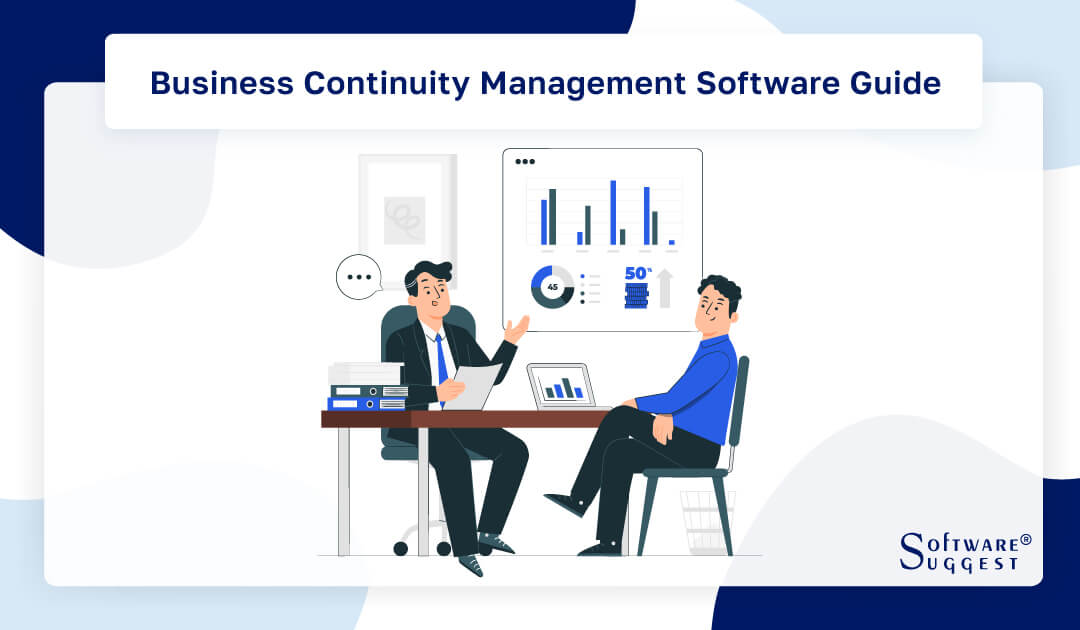
Organizations encounter an array of potential disruptions that can jeopardize their operations. From unforeseen natural calamities to cyber threats and operational mishaps, the spectrum of challenges businesses face is vast and unpredictable.
Amidst these uncertainties, what distinguishes resilient enterprises is their proactive approach to risk management and ensuring uninterrupted operations to develop detailed business continuity management processes.
Enterprises are increasingly turning to innovative solutions to shield themselves from the impacts of disruptions. One such invaluable tool gaining prominence is business continuity software. This specialized software acts as a shield, empowering businesses to prepare for, respond to, and recover from diverse disruptions efficiently.
What Is a Business Continuity Management (BCM) Software?
Business continuity management (BCM) software is a specialized tool designed to aid organizations in effectively managing and maintaining their business continuity strategies. It serves as a comprehensive platform that facilitates the development, implementation, and maintenance of plans and procedures necessary to ensure the uninterrupted operation of critical business functions during and after disruptive events.
At its core, business continuity software enables businesses to create and manage contingency plans aimed at mitigating risks and minimizing the impact of various threats or crises that could disrupt normal operations. These disruptions might encompass a wide range of incidents, including natural disasters, cyberattacks, equipment failures, supply chain interruptions, or any unforeseen events that could hinder regular business activities.
What Are the Four Components of a Business Continuity Management Plan?
A business continuity management plan (BCMP) acts as a lifeline for businesses, especially during unforeseen disruptions. Understanding its four key components is crucial for any organization aiming to fortify its resilience.
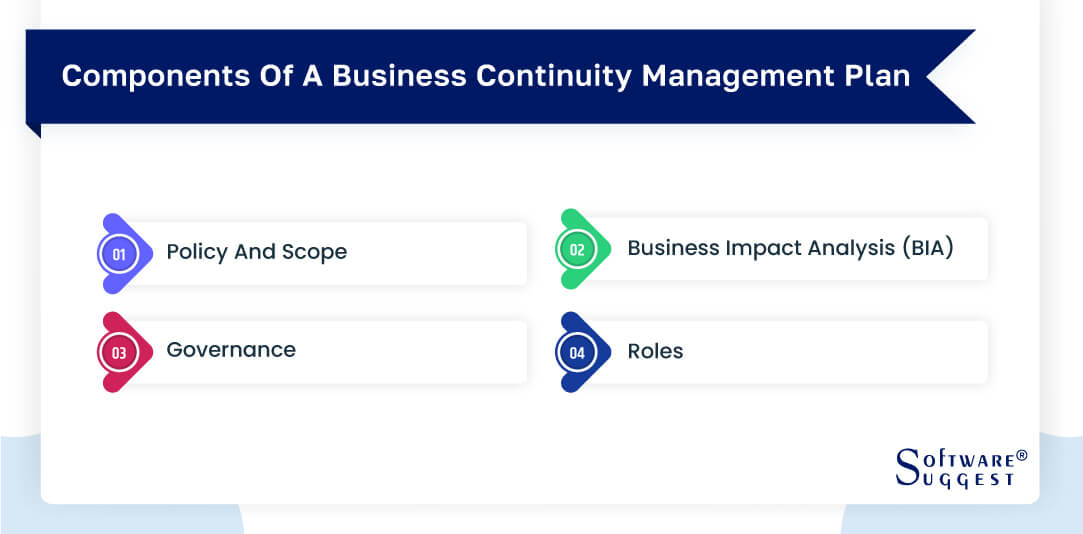
-
Policy and Scope
The first aspect of a BCMP is policy and scope. This component sets the foundation, outlining the organization's commitment towards continuity. It defines the plan's boundaries, objectives, and scope. Essentially, it's the blueprint that guides the strategic approach towards resilience, clearly laying out the roles and responsibilities of key stakeholders.
-
Business Impact Analysis (BIA)
Next up is the business impact analysis (BIA). BIA focuses on identifying and prioritizing critical business functions, assessing potential risks, and understanding how they might impact operations. It's all about quantifying downtime tolerances and establishing recovery time objectives. Organizations gain insights into dependencies and vulnerabilities by conducting a structured analysis involving data collection, analysis, and validation.
-
Governance
Governance, the third component, plays a crucial role in BCMP implementation. It establishes the framework, ensuring compliance with industry standards and regulations. Governance involves creating policies, protocols, and procedures that adhere to regulatory requirements and best practices. Moreover, it assigns leadership responsibilities, fostering accountability and enabling effective decision-making during crises.
-
Roles
Finally, we have the Roles within a BCMP. Defining roles clarifies responsibilities, ensuring designated individuals know exactly what actions to take during disruptions. Assigning trained personnel to specific roles and conducting regular training programs enhances preparedness and response efficiency. Establishing clear communication channels ensures seamless information flow, facilitating prompt decision-making when it matters the most.
What Are the Benefits of the Best Business Continuity Management Software?
Investing in top-notch business continuity management software (BCMS) can be a game-changer due to its benefits. Here are the most significant benefits that the best business continuity software can offer to organizations across industries.
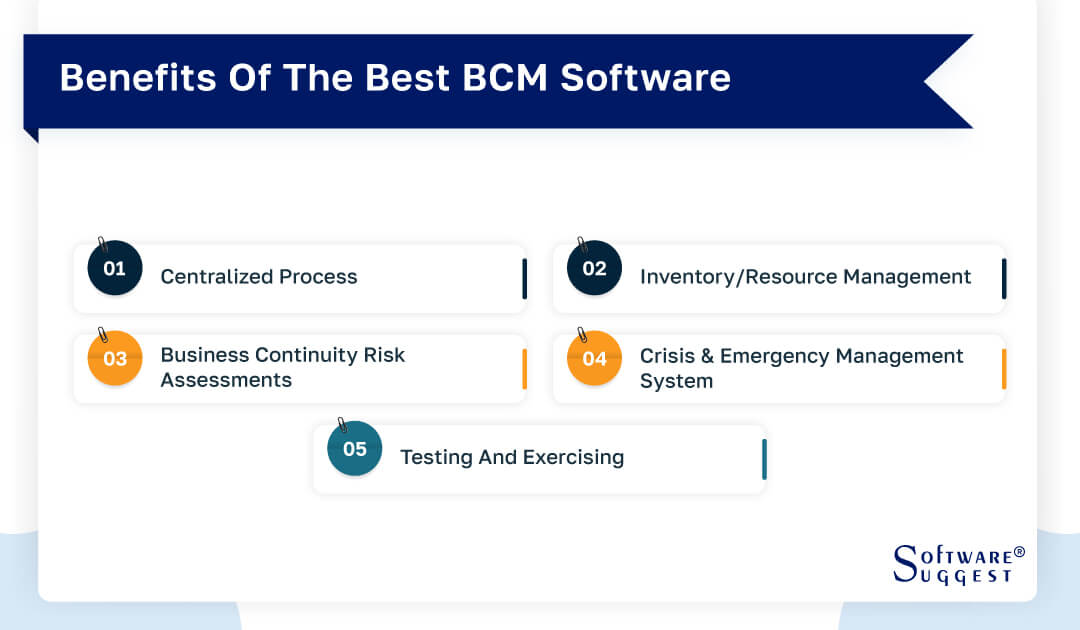
-
Centralized Process
One of the standout advantages of the best business continuity software is its ability to centralize processes. It streamlines various aspects of business continuity, providing a unified platform to manage and execute continuity plans efficiently. By centralizing processes, it minimizes confusion and enhances coordination during critical times.
-
Inventory/Resource Management
Inventory and resource management is another key facet where the best BCMS shines. It empowers organizations to maintain comprehensive inventories and manage resources effectively. This ensures that essential assets, information, and supplies are readily available when needed, thereby bolstering the organization's resilience.
-
Business Continuity Risk Assessments
Business continuity risk assessments form a vital part of any BCMS. The best business continuity software facilitates thorough risk assessments, enabling organizations to comprehensively identify potential threats and vulnerabilities. This insight aids in devising robust strategies to mitigate risks, thus safeguarding against disruptions.
-
Emergency and Crisis Management System
The inclusion of a crisis and emergency management system within the BCMS is another significant benefit. It equips organizations with the tools and frameworks necessary to respond swiftly and effectively during emergencies or crises in business operations. Such systems facilitate real-time communication, rapid decision-making, and efficient allocation of resources in critical situations.
-
Testing and Exercising
Testing and exercising capabilities provided by the best BCMS are invaluable. These functionalities allow organizations to simulate various scenarios, ensuring that their continuity plans are not just theoretical but also practical and executable. Regular testing and exercising enable teams to identify gaps, refine strategies, and improve overall preparedness.
What Are the Features of the Best Business Continuity Management Software?
Business continuity planning software contains various vital elements, each crucial for a robust system. Here's a detailed exploration of its essential features:
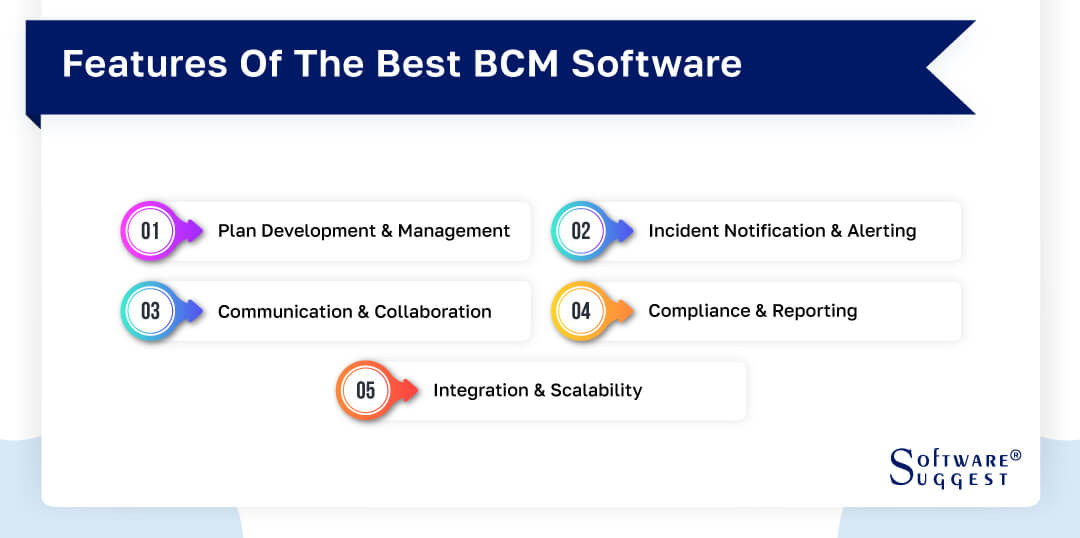
-
Plan Development and Management
Effective BCM software aids in identifying risks, defining strategies, establishing recovery procedures, and assigning responsibilities. It allows for the documentation of critical resources, recovery time objectives (RTOs), and recovery point objectives (RPOs). Moreover, it ensures regular testing, updates, and maintenance of the plan to keep it aligned with evolving business needs and potential risks.
-
Incident Notification and Alerting
In times of crisis or unexpected disruptions, instant and accurate incident notification is crucial. Advanced BCM software offers real-time alerting mechanisms through multiple communication channels such as SMS, emails, or push notifications. These systems enable predefined protocols to alert relevant stakeholders swiftly, ensuring a prompt response to mitigate the impact of the incident.
-
Communication and Collaboration
The best BCM software facilitates seamless communication among team members, stakeholders, and relevant authorities during crises. These platforms often integrate various communication channels, such as instant messaging, video conferencing platforms, and email, fostering collaboration even in remote or dispersed work environments. Moreover, some advanced systems incorporate task management functionalities, enabling teams to coordinate and track their activities.
-
Compliance and Reporting
Business continuity software comes equipped with features that streamline compliance processes and aid in generating comprehensive reports. These functionalities ensure adherence to regulatory standards while also facilitating thorough post-incident analysis. Additionally, some software solutions offer automated compliance checks and customizable reporting templates, simplifying the compliance management process for businesses across various sectors.
-
Integration and Scalability
Ensuring compatibility with existing systems and providing scalability are fundamental features of business continuity planning software. These solutions are meticulously crafted to seamlessly integrate into an organization's current IT infrastructure, thereby reducing disruptions during implementation.
How to Select the Right Business Continuity Software?
Business continuity is crucial for any organization's stability, especially during crises. To make an informed choice regarding business continuity software, consider these vital aspects:
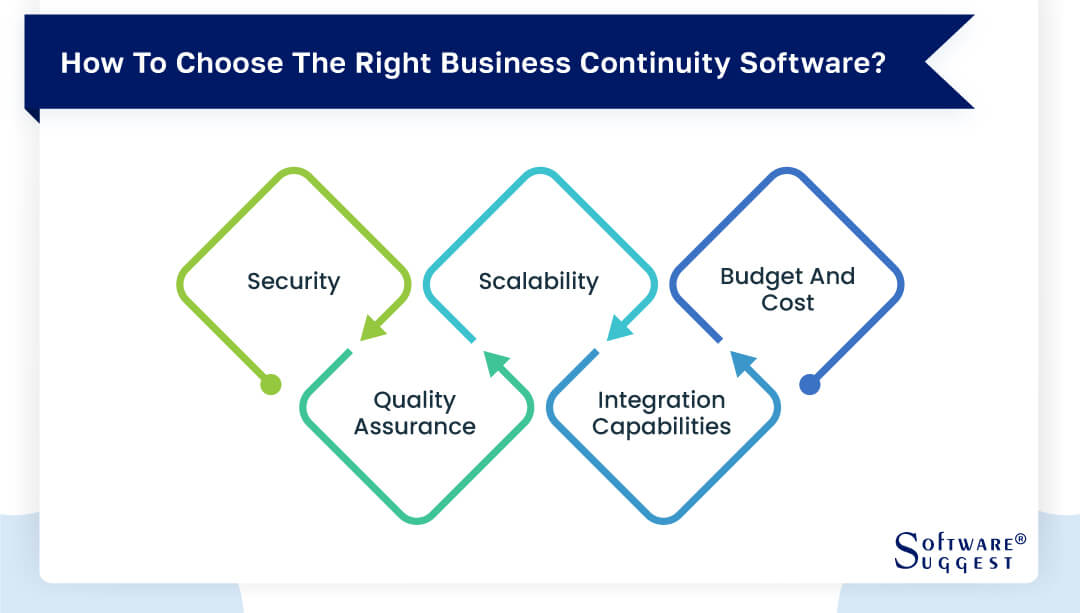
-
Security
When evaluating business continuity software, prioritizing security measures is paramount. Look for robust data protection features, including encryption protocols and compliance with industry standards. Ensure the software aligns with your organization's security requirements and offers reliable safeguards to protect sensitive information.
-
Quality Assurance
Assess the business continuity planning software's testing and validation mechanisms. Consider its reliability, performance metrics, and user feedback or reviews to ensure it meets your organization's quality standards.
Furthermore, examine the software's uptime history, error handling capabilities, and disaster recovery processes. A comprehensive quality assurance approach ensures the software operates seamlessly, even under adverse conditions.
-
Scalability
Opt for software that can scale alongside your business growth. Check its ability to handle increased demands and its flexibility to accommodate evolving needs. A software solution that offers customization options and supports various business sizes is advantageous.
Additionally, analyze the software's scalability features, including load balancing, resource allocation, and scalability testing results.
-
Integration Capabilities
Evaluate the business continuity software's compatibility with your current infrastructure, its API functionalities, and the ease of integration processes. Also, dive deeper into specific integration scenarios, such as CRM software or ERP integrations, cloud services compatibility, and third-party app integrations. Understanding these integration capabilities ensures a harmonious functioning of the software within your business ecosystem.
-
Budget and Cost
Conducting a thorough cost-benefit analysis is essential. Beyond initial pricing, evaluate long-term expenses encompassing licensing fees, maintenance costs, and potential return on investment (ROI). Additionally, consider the cost of potential downtime or data breaches when comparing software options. Look for software offering flexible pricing models that align with your budgetary constraints without compromising critical features.
What Are the Market Trends in the Business Continuity Software Program?
Understanding market trends within the business continuity software program domain helps stay ahead in a dynamic business landscape. Several notable trends are shaping the industry, emphasizing the need for businesses to adapt and leverage these advancements.
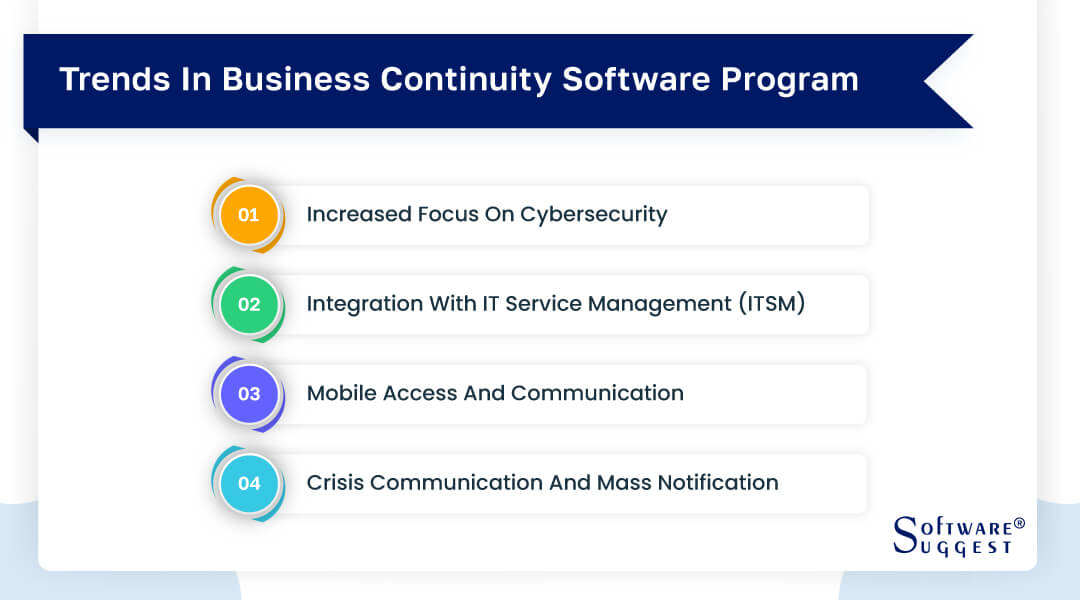
-
Increased Focus on Cybersecurity
The heightened focus on cybersecurity within business continuity software stems from the escalating threat landscape. Modern software integrates robust security features such as advanced encryption algorithms, real-time threat monitoring, and proactive incident response mechanisms to combat sophisticated cyber threats. Additionally, compliance with industry standards like GDPR and HIPAA ensures data protection and regulatory adherence.
-
Integration with IT Service Management (ITSM)
The synergy between business continuity software and IT service management (ITSM) has gained prominence. Integration fosters a cohesive approach by aligning continuity strategies with broader IT infrastructure management. The trend showcases seamless collaboration between the two, enhancing incident response, reducing downtime, and optimizing resource allocation, thereby augmenting overall organizational resilience.
-
Mobile Access and Communication
The pervasive use of mobile devices has led to a trend focusing on enabling mobile access and communication capabilities. This adaptation allows stakeholders to access critical information and communication channels via mobile devices, ensuring seamless connectivity and response coordination irrespective of their physical location. Mobile-responsive interfaces and dedicated mobile apps empower swift action and decision-making during crises.
-
Crisis Communication and Mass Notification
Enhancements in crisis communication and mass notification features are integral to effective business continuity software. Advanced systems facilitate multi-channel communication, including emails, SMS, push notifications, and social media integrations, enabling rapid dissemination of critical information during emergencies.
Also, automated response mechanisms and predefined escalation procedures ensure timely alerts and coordinated actions among response teams.
What Is the Cost of a Business Continuity Management (BCM) Software Solution?
The cost of a business continuity software solution can vary based on various factors. Typically, for small to medium-sized enterprises, the average pricing might fall between $5,000 to $50,000 annually. Nonetheless, larger organizations or those needing substantial customization and advanced functionalities might encounter costs surpassing $100,000 per year.
Generally, the cost structure for BCM software solutions can be classified into:
- License or Subscription Fees: Typically range from $500 to $1,500 per user annually. Some vendors offer discounts for higher user counts.
- Implementation and Customization Costs: Vary from $10,000 to $50,000, covering customization as per organizational needs. Additional charges may apply for consultancy services and system integration.
- Ongoing Support and Maintenance: Annual fees range from 15% to 20% of the initial software cost, approximately $3,000 to $4,000 for a $20,000 software.
- Additional Features and Modules: Cost between $2,000 to $10,000, depending on complexity and functionality.
Conclusion
Despite the benefits of utilizing business continuity planning software, numerous companies need help aiming to enhance the flexibility of their BCP/BCM programs. The adaptability of a program to address new challenges becomes increasingly difficult as its complexity grows. Additionally, adjusting at certain stages within BCM programs is easier than others due to their lifecycles.
Several businesses encounter difficulties adapting to ever-evolving threat landscapes due to a lack of fundamental understanding of the BCM approach, BCM software, and essential program components. BCM experts recommend that companies evaluate their requirements and priorities before investing in a BCM system. Furthermore, companies should consider the implementation efforts required and avoid purchasing beyond their actual needs.
FAQs
BCM software can vary in scope and functionality. Common types include Disaster Recovery Planning (DRP) software, Incident Management software, Risk Assessment software, and Crisis Communication software.
BCM software helps organizations prepare for and respond to disruptions, ensuring continuity of operations, mitigating risks, and minimizing downtime during crises.
The primary purpose of business continuity software is to enable organizations to develop and implement plans that ensure critical functions and processes can continue during and after disruptions, minimizing the impact on business operations.
By Countries
















.png)





